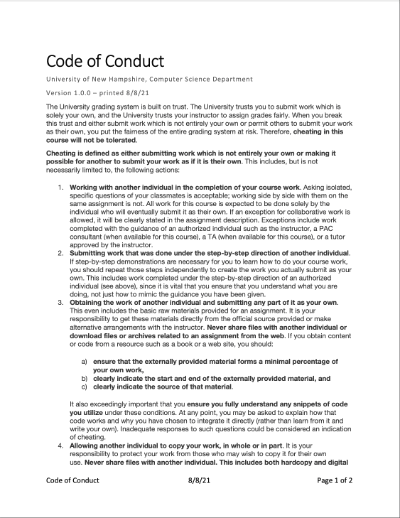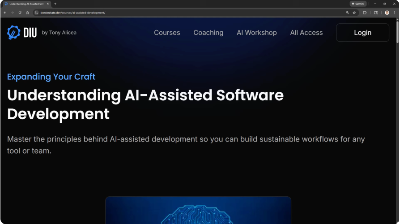Academic integrity
The academic community is built upon trust, and the consequences for violations of this trust can be very severe. Most of instructors and administrators with whom you might have to deal if you are suspected of such violations will not accept ignorance as an excuse for that behavior.
As such, it is much safer for you to avoid trouble than it is to try to extricate yourself from trouble once you're in it. And to do that, it is vitally important for you to understand both what is considered acceptable behavior and what is at stake before you find yourself in trouble. That is the purpose of the material on this page.
Before exploring further on this page, if you have not already done so, you should ensure that you have thoroughly reviewed your Student Rights, Rules, and Reponsibilities handbook as published by UNH, paying particular attention to the subsection on Academic Honesty found within the section on Academic Policies. A basic understanding of that material will be assumed by most of the professors and administrators with whom you interact in your time at UNH.

1 Academic integrity
Video: ~45 minutes
This video endeavors to explain the most essential things you need to know to avoid accusations that you have violated the expectations of academic integrity in the classroom. In general, the instructors and administrators with whom you interact at UNH will assume you know this material.

2 Cheating Yourself
Video: ~6 minutes
This video endeavors to explain why and how the individual that suffers the most harm from cheating is the cheater themselves.

3 Code of Conduct
PDF: 2 pages
This document represents a Code of Conduct that I have historically used in my courses. It is not universally applicable to all courses, and I often need to customize and fine-tune it in the context of individual courses. However, it provides you with a solid starting point for all of your courses in that if you abide by its guidance you should avoid most of the problematic scenarios you might otherwise encounter. Be sure, however, that you are aware of any additional concerns that might have been presented by the professor teaching each of your courses, as their policies will always override these.

4 Understanding AI-Assisted Development (First Hour)
Video: ~54 minutes
(OPTIONAL) This YouTube video is the first hour of lectures from a non-credit course offered by Tony Alicea, and it provides an excellent overview of what a Large Language Model (LLM) is and how it works. Although the use of LLMs is not always a violation of academic integrity (the rules vary from course to course and instructor to instructor), this seemed like an appropriate place to include this information. Regardless of how you are using an LLM, it is extremely important to know exactly what you can (and cannot) expect from it, and this video does an admirable job of explaining that.